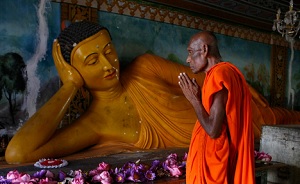"Bhikkhus, if you develop and make much this one thing, it invariably leads to weariness, cessation, appeasement, realization and extinction. What is it? It is recollecting the Enlightened One. If this single thing is recollected and made much, it invariably leads to weariness, cessation, appeasement, realization and extinction.
Bhikkhus, if you develop and make much this one thing, it invariably leads to weariness, cessation, appeasement, realization and extinction. What is it?
It is recollecting the Dhamma,..re... the Sangha,..re.. virtues,..re... benevolence, ..re.. gods..re.. mindfulness of in breaths and out breaths,.. re.. death, ..re.. mindfulness of the body, ..re.. mindfulness of appeasement.
If this single thing is recollected and made much, it invariably leads to weariness, cessation, appeasement, realization and extinction."









 Monks pray on the steps of the Dhammakaya sect's main "spaceship" temple. The National Office of Buddhism has called on fugitive Phra Dhammajayo to turn himself in and face the music. (Reuters photo)
Monks pray on the steps of the Dhammakaya sect's main "spaceship" temple. The National Office of Buddhism has called on fugitive Phra Dhammajayo to turn himself in and face the music. (Reuters photo)

 The 1,800-year-old Vihara is situated 25 kilometres from Mingora. PHOTO: SHEHZAD KHAN/ EXPRESS
The 1,800-year-old Vihara is situated 25 kilometres from Mingora. PHOTO: SHEHZAD KHAN/ EXPRESS 






